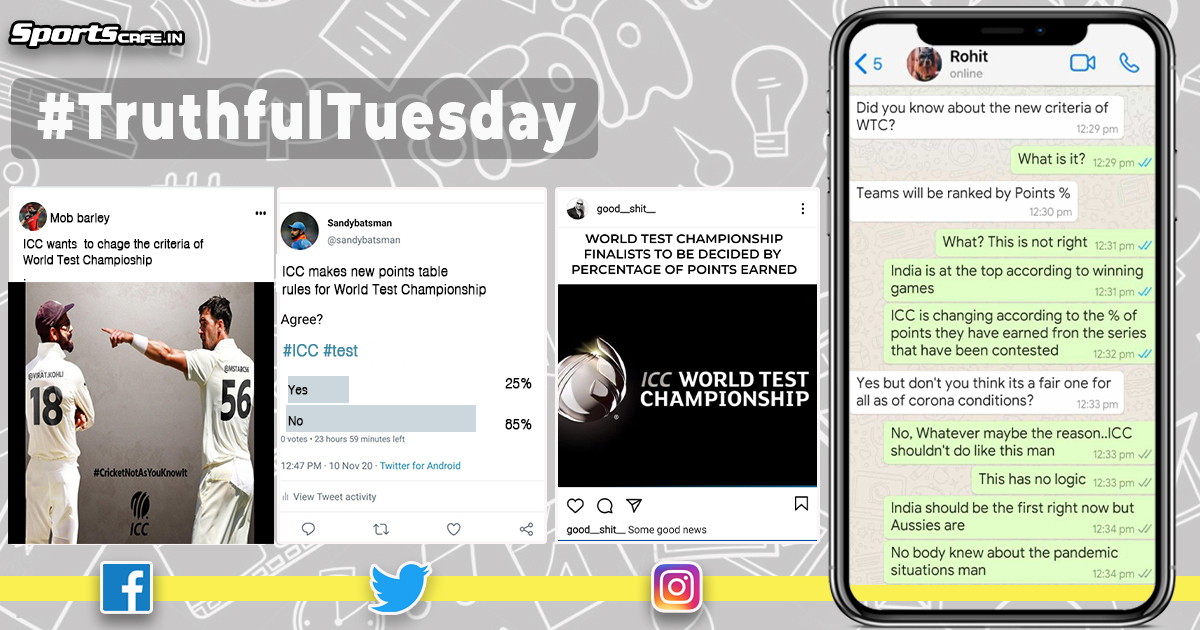Truthful Tuesday | ICC’s desire of adding more flaws to an already-flawed product clutters WTC

ICC planning to bring in percentages to decide finalists
|SportsCafe
Nothing in the ICC boardroom encapsulates the drama better than a classic Indian movie. It is both the drama and the story, it is mythic storytelling yet a fulcrum to a double-edged world that thrives on its narrative. The beneficiary of the entire idea is, however, left to interpretation.
The recent Nawazuddin Siddique-starrer Serious Men, on Netflix, is a cultural masterpiece. It conned the world to believe in its innocence while leaving the gaping hole in society - the proposed difference between the haves and have nots - to exploit the systemic anarchy. It is possibly the story of world cricket too which has left itself to a degree of defiance from which you could never really take the haves out of the have nots. Growth, vision, and transparency are mere buzzwords that make you believe.
Well, even if that might not be the original thought-process of the ICC Cricket Committee when they proposed the theory that the World Test Championship (WTC) to be decided by the percentage of points teams have earned from those they have actually contested for, it is hard to think otherwise. The 'least bad' option is just the last straw that the sport needed to dilute an already complicated and unfair process that we pretend to believe is good for red-ball cricket.
Let’s go to the report that the Anil Kumble-led committee suggested to the Chief Executives Committee whose meeting has already begun with more important things on the task list. The suggestions have left the pure numerical out of the equation, leaving the percentage to call shots. That would mean it will relegate India, which otherwise have the lead on the table, to the second position behind Australia, who have 82.22% of points so far.
The percentile arguments might help the teams who have more home matches at the front-end of the tournament - read India, Australia and England - but other teams are in a precarious situation after losing out on some easy grabs. Consider South Africa who would have fancied their chances against Bangladesh and West Indies, or Sri Lanka, who could have gained some rating points from the Bangladesh series to boost their chances to stay afloat in the next edition. But as it stands, India, England, Australia, and darkhorses New Zealand are the only four teams in the race despite 2020 seeing very little cricket being played.
The realistic impact of the scenario can be determined from the fact that New Zealand have a great chance of sweeping 240 points on offer in their home season to boost their percentage to a better position. It would invariably leave India and England to play catch-ups if Australia beat India handsomely at home. If India lose the series 2-0 against Australia and then come back to sweep the England series, the flaw will be widened massively. That a team without winning a Test match away, barring the series against Windies, will be contesting the final of the grand event. ICC needs to understand that this kind of sorcery is beyond comprehension and a long shot away from what they promised to cricket fans the world over a year and a half ago.
Making the World Test Championship a four-way race at a time when England are the only team to have hosted any Test cricket post-pandemic is severely unfair on the other small nations whose Test audience, and the corresponding money they earn through this, is smaller than ever. It also beats the basic purpose of the World Test Championship that ICC General Manager Geoff Allardice had announced so proudly at the launch of the product last year.
“The ICC Men’s Cricket World Cup this summer showed just how important it is for every game to count and for the world’s best teams to go head-to-head. The World Test Championship will bring relevance and context to bilateral Test cricket over the next two years, creating a pinnacle event for the five-day format, just as the World Cups for men and women do in the ODI and T20I formats,” Allardice had said in 2019.
Sure enough, the pandemic has thrown a spanner in their works, leaving the cricket boards and the ICC in a state of mess and perpetual confusion, but that can’t be the basis of a horror show that we are witnessing at the moment. For instance, the ICC is yet to tell us the plans for the second edition of the World Test Championship and if the playing conditions will undergo any change. Especially the points allocation system that has been a major point of contention for the longest period of time. Those are the issues that need to be talked about ahead of time and given clarity on, rather than pushing the cause for an edition that everyone has already forgotten.
The wiser decision should have been to announce the ongoing edition null and void while prepping for a smoother and well-planned edition in the 2021-2023 rights cycle. Now that the world’s cricket bodies have an answer to Covid-19 thanks to bio bubbles, the next rights cycle can go in a smooth manner. The interim period will also allow the ICC the luxury of doing away with the very inflammable concerns cricket is currently grappling with.
To be fair with the ICC, they haven’t announced the change officially, and putting the blame squarely on them would be veering away from honesty but history has been a witness. As the cricket board meet online to cast their votes for the next ICC Chairman position, it needs to be understood that the underlying idealism has a very way of biting back at whoever takes over the hot seat. For now, can the cricket committee do their bit and not worry about the commercial aspects, once?
